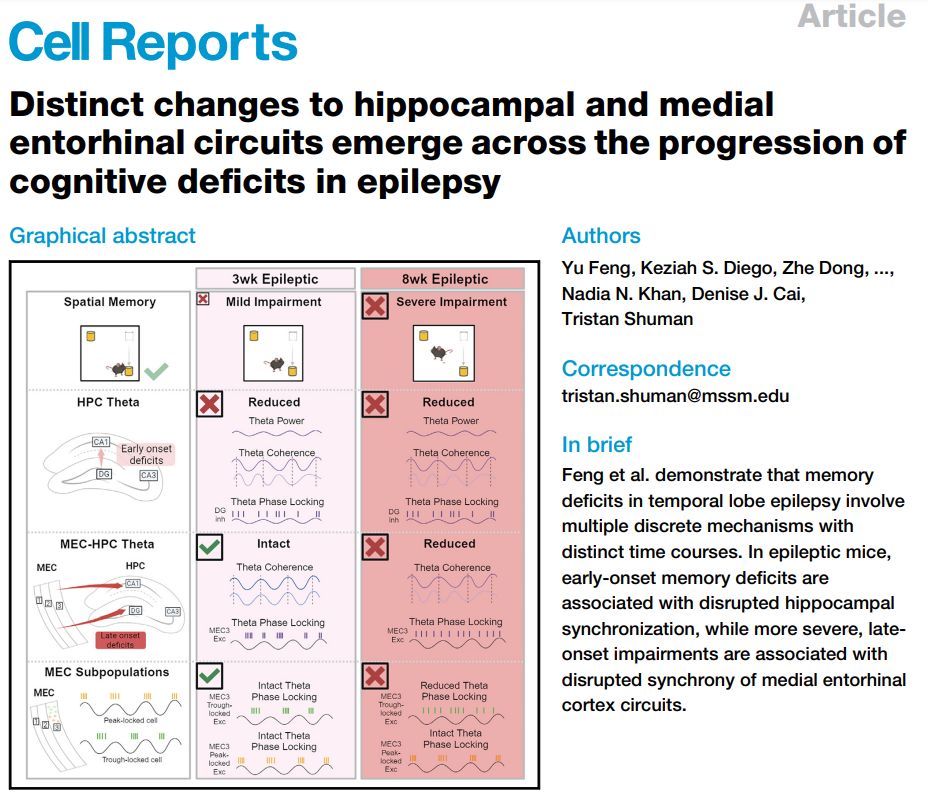
Tristan Shuman
@tristanshuman.bsky.social
Neuroscientist studying memory, epilepsy, and Alzheimer’s disease.
Associate Professor at Icahn School of Medicine at Mount Sinai
Associate Professor at Icahn School of Medicine at Mount Sinai
This work was led by the amazing @susieyufeng.bsky.social but was a huge team effort across the Shuman and Cai Labs!
All of the data is available online and we hope other labs will be able to utilize it to answer other questions about epileptic circuits in MEC and hippocampus.
All of the data is available online and we hope other labs will be able to utilize it to answer other questions about epileptic circuits in MEC and hippocampus.

January 28, 2025 at 8:17 PM
This work was led by the amazing @susieyufeng.bsky.social but was a huge team effort across the Shuman and Cai Labs!
All of the data is available online and we hope other labs will be able to utilize it to answer other questions about epileptic circuits in MEC and hippocampus.
All of the data is available online and we hope other labs will be able to utilize it to answer other questions about epileptic circuits in MEC and hippocampus.
In particular, the MEC cell type that was most impaired were "Trough-locked" cells in layer 3, which were recently characterized as predictive grid cells (doi.org/10.1126/scie...). Their dysfunction suggests this cell type may be uniquely vulnerable in epilepsy and contribute to memory deficits.

January 28, 2025 at 8:17 PM
In particular, the MEC cell type that was most impaired were "Trough-locked" cells in layer 3, which were recently characterized as predictive grid cells (doi.org/10.1126/scie...). Their dysfunction suggests this cell type may be uniquely vulnerable in epilepsy and contribute to memory deficits.
By 8 weeks after pilocarpine, the synchronization within MEC and between MEC and hippocampus became impaired. These deficits aligned with the onset of severe memory impairments, suggesting that changes in MEC may underlie progressive memory impairment in epilepsy.

January 28, 2025 at 8:17 PM
By 8 weeks after pilocarpine, the synchronization within MEC and between MEC and hippocampus became impaired. These deficits aligned with the onset of severe memory impairments, suggesting that changes in MEC may underlie progressive memory impairment in epilepsy.
To investigate the circuits that drive this progressive memory impairment we recorded HPC and MEC simultaneously as epileptic and control mice explored a virtual linear track. We found early changes in theta power, coherence, and interneuron phase locking only in hippocampus, while MEC was intact.

January 28, 2025 at 8:17 PM
To investigate the circuits that drive this progressive memory impairment we recorded HPC and MEC simultaneously as epileptic and control mice explored a virtual linear track. We found early changes in theta power, coherence, and interneuron phase locking only in hippocampus, while MEC was intact.
First we found that memory deficits after pilocarpine were progressive, with minor early deficits (within 3 weeks) and more severe deficits 8 weeks after pilocarpine. Yet there were no changes in seizures or cell death across these time points suggesting altered neural activity drives these effects.

January 28, 2025 at 8:17 PM
First we found that memory deficits after pilocarpine were progressive, with minor early deficits (within 3 weeks) and more severe deficits 8 weeks after pilocarpine. Yet there were no changes in seizures or cell death across these time points suggesting altered neural activity drives these effects.
New paper out in Cell Reports! Led by @susieyufeng.bsky.social, we found that chronic epilepsy in mice drives distinct synchronization deficits in hippocampus and MEC, with early changes in HPC and late-onset changes in MEC that align with progressive memory impairment.
www.cell.com/cell-reports...
www.cell.com/cell-reports...

January 28, 2025 at 8:17 PM
New paper out in Cell Reports! Led by @susieyufeng.bsky.social, we found that chronic epilepsy in mice drives distinct synchronization deficits in hippocampus and MEC, with early changes in HPC and late-onset changes in MEC that align with progressive memory impairment.
www.cell.com/cell-reports...
www.cell.com/cell-reports...
Come work with us at Mount Sinai! We have an open search for tenure-track faculty in the Department of Neuroscience focusing on Computational and Systems Neuroscience. Feel free to reach out to me with questions.
neuroscience.mssm.edu/docs/Faculty...
Initial review will begin next week!
neuroscience.mssm.edu/docs/Faculty...
Initial review will begin next week!

November 13, 2024 at 11:17 PM
Come work with us at Mount Sinai! We have an open search for tenure-track faculty in the Department of Neuroscience focusing on Computational and Systems Neuroscience. Feel free to reach out to me with questions.
neuroscience.mssm.edu/docs/Faculty...
Initial review will begin next week!
neuroscience.mssm.edu/docs/Faculty...
Initial review will begin next week!
And of course a HUGE thank you to the incredible team that made this work happen! In particular, thanks to the amazing Susie Feng, who brought this huge effort together.

March 15, 2024 at 7:10 PM
And of course a HUGE thank you to the incredible team that made this work happen! In particular, thanks to the amazing Susie Feng, who brought this huge effort together.
Together, these findings demonstrate that progressive memory impairment in epilepsy is associated with distinct early changes in hippocampus and late-onset deficits in medial entorhinal circuits.
More details and analysis in the preprint! Would love to hear your thoughts on it!
More details and analysis in the preprint! Would love to hear your thoughts on it!

March 15, 2024 at 7:09 PM
Together, these findings demonstrate that progressive memory impairment in epilepsy is associated with distinct early changes in hippocampus and late-onset deficits in medial entorhinal circuits.
More details and analysis in the preprint! Would love to hear your thoughts on it!
More details and analysis in the preprint! Would love to hear your thoughts on it!
Interestingly, we found two distinct sub-populations with opposite theta phase preferences in MEC layer 3 excitatory cells. In epileptic mice, only the Trough-locked sub-population were impaired, suggesting this distinct subpopulation is uniquely vulnerable in epilepsy.

March 15, 2024 at 7:09 PM
Interestingly, we found two distinct sub-populations with opposite theta phase preferences in MEC layer 3 excitatory cells. In epileptic mice, only the Trough-locked sub-population were impaired, suggesting this distinct subpopulation is uniquely vulnerable in epilepsy.
In MEC, spike timing of excitatory neurons in both layer 2 and layer 3 were intact at the early time point when HPC deficits and minor memory impairment were already observed. However, we observed late-onset changes to MEC excitatory neuron theta phase locking in epileptic mice.

March 15, 2024 at 7:08 PM
In MEC, spike timing of excitatory neurons in both layer 2 and layer 3 were intact at the early time point when HPC deficits and minor memory impairment were already observed. However, we observed late-onset changes to MEC excitatory neuron theta phase locking in epileptic mice.
Within the HPC, we found theta synchronization and spike timing are largely disrupted within the first 3 weeks of epileptogenesis, matching the timeline of early minor memory deficits.

March 15, 2024 at 7:08 PM
Within the HPC, we found theta synchronization and spike timing are largely disrupted within the first 3 weeks of epileptogenesis, matching the timeline of early minor memory deficits.
To examine the neural circuits that contribute to this progressive memory impairment, we performed dual-region hippocampal (HPC) and medial entorhinal cortex (MEC) recordings using silicon probes in behaving control and epileptic mice at 3 or 8 weeks after pilocarpine treatment.

March 15, 2024 at 7:08 PM
To examine the neural circuits that contribute to this progressive memory impairment, we performed dual-region hippocampal (HPC) and medial entorhinal cortex (MEC) recordings using silicon probes in behaving control and epileptic mice at 3 or 8 weeks after pilocarpine treatment.
We first characterized the progression of memory impairment after pilocarpine. We found mild spatial memory deficits 3 weeks after pilocarpine, but more severe impairment by 8 weeks after pilocarpine. Thus, there is a clear progression of memory impairment after pilocarpine.

March 15, 2024 at 7:07 PM
We first characterized the progression of memory impairment after pilocarpine. We found mild spatial memory deficits 3 weeks after pilocarpine, but more severe impairment by 8 weeks after pilocarpine. Thus, there is a clear progression of memory impairment after pilocarpine.

